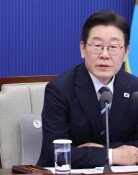[Editorial] Kim Jong-Il's underlying goal for Chinese visit
[Editorial] Kim Jong-Il's underlying goal for Chinese visit
Posted January. 16, 2001 19:40,
The planned visit to China by North Korean Defense Commission Chairman Kim Jong-Il will mark a turning point in Pyongyang's foreign policy this year. Recalling that the North Korean leader visited Beijing in late May last year, just two weeks before the mid-June South-North Korean summit in Pyongyang, his trip to China demonstrates how boldly the North is attempting to cope with the rapidly changing situation surrounding the Korean peninsula.
In view of the fact that during his previous China visit, Kim inspected an electronics industry complex in Beijing and that he reportedly plans to tour the economic zone in Shanghai, it is easily assumed what the North Korean leader has in mind for his trip. Kim underlined technological reform as the focus of economic development at the beginning of the year. In light of this, it is obvious that Kim's aim is to emulate China's economic reform and open-door trade policies.
Another likely goal of Kim's China visit is to strengthen diplomatic relations with Beijing and coordinate foreign policies with respect to the incoming administration of United States President-elect George W. Bush. Even before the inauguration of the new administration in Washington, mostly negative views are being aired over the current state of North Korea-U.S. relations. More over, there is a rising debate in Washington concerning the proposed National Missile Defense (NMD) system, which both the North and China strongly oppose. Therefore, it seems that the primary reason for Kim's hurried trip to Beijing was to build a new diplomatic framework with China, timed with the imminent inauguration of the Bush administration.
At any rate, Kim's interest in China's reformative economic and trade policies and related discussions on strengthening mutual cooperation with Beijing, are expected to have a positive influence on inter-Korean ties.
Firm in the belief that peace and stability on the Korean peninsula is essential, Beijing currently plays a positive role as an intermediary for the parties involved, such as in the four-party peace talks among the two Koreas, the U.S. and China.
On the other hand, it is feared that relations between Washington and Beijing may deteriorate with the inauguration of the new U.S. administration, a development that would have a negative impact on inter-Korean relations. From this viewpoint, we would like to caution that strengthened Beijing-Pyongyang ties should not stand in the way of improving North Korea-U.S. relations.
Since the start of the year, the North seems to have been stepping up its diplomatic effort toward the South. Conspicuous is that Pyongyang underscored the need for the implementation of the June 15 Inter-Korean Joint Declaration. Also notable is the fundamental change in inter-Korean relations. In this regard, Kim's forthcoming visit to Seoul will hopefully provide momentum for even closer ties.



![연금 개시 가능해지면 年 1만 원은 꼭 인출하세요[은퇴 레시피]](https://dimg.donga.com/c/138/175/90/1/wps/NEWS/IMAGE/2026/02/20/133390850.4.jpg)



